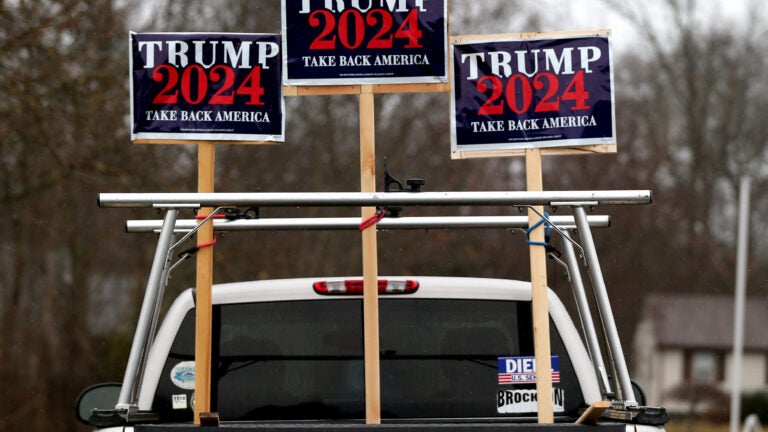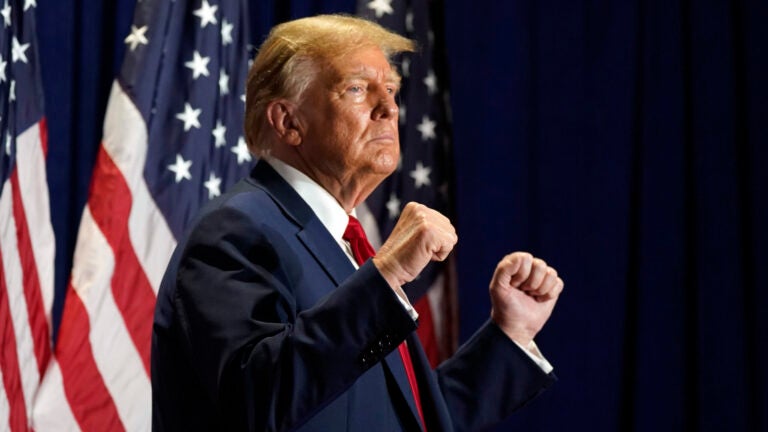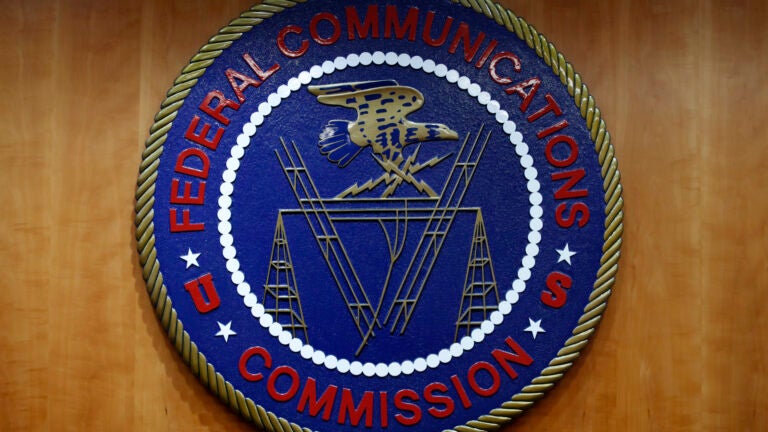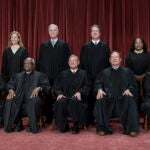‘A slam dunk 9-0 decision’: Readers weigh in on Trump ballot ruling
More than 630 readers responded when we asked if they agreed with the Supreme Court’s ruling on Monday. Here’s what they said.
The Supreme Court ruled on Monday that states cannot bar former president Donald Trump from presidential primary ballots, effectively ending challenges in several states — including Massachusetts — that sought to prove him constitutionally ineligible to appear.
The court reversed a Dec. 19 ruling by the Colorado Supreme Court, which had alleged that Trump could not run again as president under Section 3 of the Constitution’s 14th Amendment, the so-called “insurrection clause.”
The justices ruled that states cannot invoke the Civil War-era provision to keep presidential candidates from appearing on ballots. Rather, that power is reserved for Congress to wield, the court wrote in their unanimous decision.
This means Republican voters across the country will see Trump’s name on their presidential primary ballot, as well as Chris Christie, Ryan Binkley, Vivek Ramaswamy, Asa Hutchinson, Ron DeSantis, and Nikki Haley. Massachusetts and a dozen more states are holding their presidential primaries on Tuesday in what is called “Super Tuesday.”
More than 630 readers responded when we asked if they agreed with the Supreme Court’s March 4 ruling. The vast majority (66%) said they agree with the court’s decision, with 33% disagreeing.
This is a marked change from just a few months ago, when we first asked readers to weigh in on Trump’s ballot eligibility. Based on the results of our informal surveys, Boston.com readers now are significantly more certain about where they stand on the issue than they were at the start of the year.
In January, we asked our readers if the former president should appear on the ballot in the presidential primaries. At the time, the state Supreme Court decisions in Maine and Colorado had just been filed, and Massachusetts would file a challenge just a few days later.
Of the 263 respondents to the January poll, readers were nearly split equally on the issue: a slight majority (50%) said they disagreed with the court rulings to bar Trump from the ballot, with 49% approving of the decisions.
Below, see a sampling of readers sharing their take on the Supreme Court’s March 4 ruling to restore Trump to the ballot.
Responses have been lightly edited for grammar and clarity.
Do you agree with the Supreme Court’s ruling?
Yes
“As much as I despise his politics, he hasn’t been convicted of anything yet. So, his name should remain on the ballot. He is innocent until proven guilty in a court of law.” — Barbara S., Boston
“Absolutely. I am not a Trump fan but it sets a very dangerous precedent to block who can run for office.” — Stacey, Salem
“Lawfare, the political weaponization of the justice system, to take down the favorite candidate of the opposition party is a form of banana-republic-ism. Ours is a nation of the people, by the people, for the people, and protected by the Constitution. This was a slam dunk 9-0 decision for all the right reasons.” — Fred M., Waltham
“This Supreme Court decision will calm down some of the turmoil and allow us to have a normal presidential election in 2024, where the people can just vote for whoever they want. That’s how it should be!” — David B., Onset
“It is an issue of federal versus states rights. The Supreme Court is the body we entrust to sort these details out, and they did, on those exact lines. There are various processes to remove candidates from ballots. The wrong process was used. The candidate in question may be contentious, yet that is not a lawsuit issue, it is a ballot issue.” — Mike, Manchester
“It should be a federal issue up to the Congress as the court said. I could see it getting out of control otherwise if the court had upheld it. There were multiple states ready to ban him and if that happened I could see multiple states wanting to ban Biden for not securing the border. Texas, Florida and many other possibilities come to mind. You would have chaos.” — Stan, Jamaica Plain
“The court deemed that Congress is the governing body that has the power to basically determine the parameters of enforcement for the 14th amendment. If states start removing candidates based off of what they determine to be ‘due process’, the goal posts for what ‘due process’ will change, and the power has the potential to be abused and remove candidates from the opposition party from ballots, removing the ability of people to vote for potentially qualified candidates. If, when, and how the 14th amendment comes into play needs to be better codified into law so as to remove ambiguity and reduce the potential for political abuse. In terms of how this will play out for the election, a particular candidate is going to count this as a huge political victory in their favor and will very likely attempt to leverage it to their advantage. The reality is, this decision is necessary to continue to give democracy a chance to work.” — Bernie, Rockland
No
“Giving Congress the sole right of imposing their authority on states’ decision-making and autonomy, in regards to presidential leadership, is a very broad stroke to curtailing states rights and is a mistake setting a dangerous precedent limiting democratic freedom and rights of the citizens to determine their own government.” — Jeanmarie L., Boston
“The Supreme Court has been touting ‘originalist’ philosophy for some time now. While I strongly disagree with this originalism idea, which essentially says the Constitution is to be taken as literal intention of its writers, this has been the Court’s stance. Now we see that is not the case, because the Justices see fit to interpret, rather than take literally, what the Constitution says. There is no other way to view this recent ruling about Trump and insurrection. He clearly cited insurrection, and the Constitution clearly bans from office those who do so.” — Matthew B., Lincoln
“While the decision is correct and unanimous that only Congress has the power to block a candidate, the SCOTUS once again erroneously missed the glaring ‘elephant in the room’ — Congress already has weighed a decision on whether Donald Trump engaged in an insurrection. While he wasn’t convicted, this was validated by a simple majority vote in both chambers. The lawsuit was looking for validation on the insurrection finding. I think it just illustrates how corrupt, myopic, and perhaps confused, the courts have become — not to mention setting up a potential constitutional crisis. It seems every time they have a decision before them which could restore faith in the court, they punt it to someone else.” — Marc
“The Constitution is clear: Insurrectionists like Trump are not eligible for the presidency. If Congress does not act to uphold the constitution, the states should be able to.” — Jimmy, Medford
“I am hoping it energizes voters to not elect the person facing multiple criminal charges, including trying to overthrow the government.” — Don, Boston
“Most will take this as a ruling that Trump didn’t incite an insurrection, but that’s not what the ruling actually says. It simply says that state courts don’t have the authority to bar people from running for federal office under clause 3 of the 14th Amendment, and that instead, that authority resides solely with Congress. In other words, the Court is, as it often does, taking the coward’s way out and ignoring the actual issue. If the clause was only intended to expand congressional authority to enact a law preventing insurrectionists from running for office (as the authors of the opinion suggest), and not as an express limitation on eligibility, it would probably actually say that. But it does not. Instead, it says *point blank* that they aren’t eligible. The language is unambiguous: insurrectionists cannot run. And the Supreme Court therefore had an obligation, which it ignored, to actually rule on whether Trump committed an insurrection. Watching the purported party of ‘state rights’ and ‘federalism’ fall all over itself to limit states rights is amusing.” — Andrew, Providence, R.I.
Boston.com occasionally interacts with readers by conducting informal polls and surveys. These results should be read as an unscientific gauge of readers’ opinion.










Be civil. Be kind.
Read our full community guidelines.